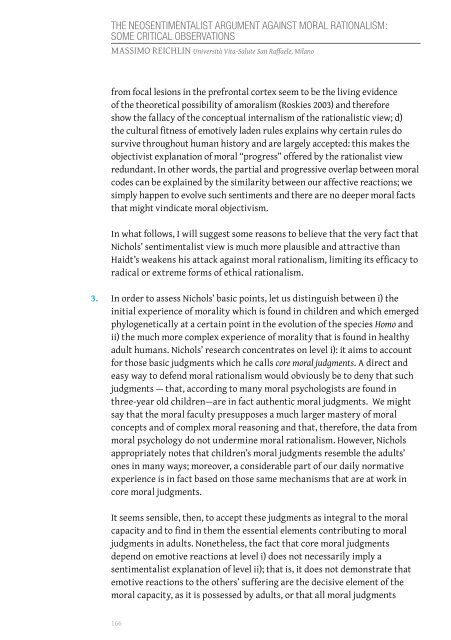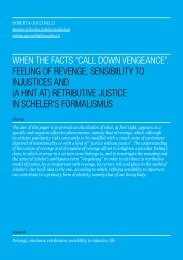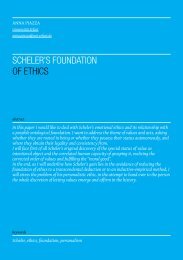the neosentimentalist argument against moral rationalism
the neosentimentalist argument against moral rationalism
the neosentimentalist argument against moral rationalism
You also want an ePaper? Increase the reach of your titles
YUMPU automatically turns print PDFs into web optimized ePapers that Google loves.
3.<br />
<strong>the</strong> neosentiMentalist aRGuMent aGainst MoRal RationalisM:<br />
soMe CRitiCal oBseRVations<br />
massimo reichlin università Vita-Salute San raffaele, milano<br />
from focal lesions in <strong>the</strong> prefrontal cortex seem to be <strong>the</strong> living evidence<br />
of <strong>the</strong> <strong>the</strong>oretical possibility of a<strong>moral</strong>ism (roskies 2003) and <strong>the</strong>refore<br />
show <strong>the</strong> fallacy of <strong>the</strong> conceptual internalism of <strong>the</strong> rationalistic view; d)<br />
<strong>the</strong> cultural fitness of emotively laden rules explains why certain rules do<br />
survive throughout human history and are largely accepted: this makes <strong>the</strong><br />
objectivist explanation of <strong>moral</strong> “progress” offered by <strong>the</strong> rationalist view<br />
redundant. in o<strong>the</strong>r words, <strong>the</strong> partial and progressive overlap between <strong>moral</strong><br />
codes can be explained by <strong>the</strong> similarity between our affective reactions; we<br />
simply happen to evolve such sentiments and <strong>the</strong>re are no deeper <strong>moral</strong> facts<br />
that might vindicate <strong>moral</strong> objectivism.<br />
in what follows, i will suggest some reasons to believe that <strong>the</strong> very fact that<br />
nichols’ sentimentalist view is much more plausible and attractive than<br />
Haidt’s weakens his attack <strong>against</strong> <strong>moral</strong> <strong>rationalism</strong>, limiting its efficacy to<br />
radical or extreme forms of ethical <strong>rationalism</strong>.<br />
in order to assess nichols’ basic points, let us distinguish between i) <strong>the</strong><br />
initial experience of <strong>moral</strong>ity which is found in children and which emerged<br />
phylogenetically at a certain point in <strong>the</strong> evolution of <strong>the</strong> species homo and<br />
ii) <strong>the</strong> much more complex experience of <strong>moral</strong>ity that is found in healthy<br />
adult humans. nichols’ research concentrates on level i): it aims to account<br />
for those basic judgments which he calls core <strong>moral</strong> judgments. a direct and<br />
easy way to defend <strong>moral</strong> <strong>rationalism</strong> would obviously be to deny that such<br />
judgments — that, according to many <strong>moral</strong> psychologists are found in<br />
three-year old children—are in fact au<strong>the</strong>ntic <strong>moral</strong> judgments. We might<br />
say that <strong>the</strong> <strong>moral</strong> faculty presupposes a much larger mastery of <strong>moral</strong><br />
concepts and of complex <strong>moral</strong> reasoning and that, <strong>the</strong>refore, <strong>the</strong> data from<br />
<strong>moral</strong> psychology do not undermine <strong>moral</strong> <strong>rationalism</strong>. however, nichols<br />
appropriately notes that children’s <strong>moral</strong> judgments resemble <strong>the</strong> adults’<br />
ones in many ways; moreover, a considerable part of our daily normative<br />
experience is in fact based on those same mechanisms that are at work in<br />
core <strong>moral</strong> judgments.<br />
it seems sensible, <strong>the</strong>n, to accept <strong>the</strong>se judgments as integral to <strong>the</strong> <strong>moral</strong><br />
capacity and to find in <strong>the</strong>m <strong>the</strong> essential elements contributing to <strong>moral</strong><br />
judgments in adults. none<strong>the</strong>less, <strong>the</strong> fact that core <strong>moral</strong> judgments<br />
depend on emotive reactions at level i) does not necessarily imply a<br />
sentimentalist explanation of level ii); that is, it does not demonstrate that<br />
emotive reactions to <strong>the</strong> o<strong>the</strong>rs’ suffering are <strong>the</strong> decisive element of <strong>the</strong><br />
<strong>moral</strong> capacity, as it is possessed by adults, or that all <strong>moral</strong> judgments<br />
166




